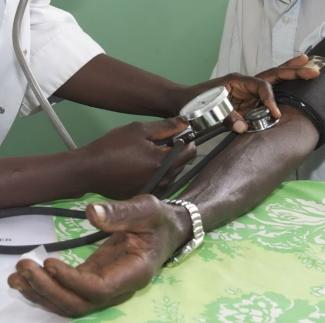High blood pressure
A social divide
 Marscha/Imagebroker/Lineair
Marscha/Imagebroker/Lineair
According to a 2016 report by the World Health Organization, some 45 % of Africans suffer from high blood pressure. In Nigeria, the data indicated a 35 % prevalence of hypertension.
The report’s author, Abdikamal Alisalad attributed the rising incidences to unhealthy lifestyle choices and urbanisation. Men were said to be slightly more at risk than women. Alisalad said lifestyle choices including poor diet full of sodium and cholesterol fats and lack of adequate exercise are key contributors. Moreover, people are generally getting older, and the risk of hypertension increases with age.
One reason why hypertension is less common in rural areas is that people there tend to do many kinds of physical work, which means they exercise their bodies. Moreover, their traditional diets normally do not include much fat or salt.
Hypertension is considered to be Nigeria’s most common non-communicable disease, causing about 44 % of sudden deaths. The condition can lead to heart attack, stroke, kidney damage and other organ failures. If hypertension is managed well, these disasters can be prevented.
Two thirds of Nigeria’s 180 million people live below the poverty line. To them, health insurance is a luxury. Only the rich and the upper middle class have good access to all kinds of health care. Therefore, they are more likely to consult specialists when they experience early symptoms like headaches, chest pain, breathing difficulties, blurry vision or constant tiredness. They are diagnosed early, and they can afford the many tests needed to evaluate to what extent vital organs are damaged. They also have the financial means to pay for appropriate treatment.
Their life changes after they are diagnosed, but it is not in immediate danger. They are told to exercise more, adopt a healthy diet and take specific pharmaceuticals.
The fate of the poor and the lower middle class is completely different. Typically, they ignore early symptoms, hoping they will go away by themselves. If that does not happen, they try to cure them with cheap over-the-counter medication. Some people resort to traditional medicine. Without a proper diagnosis, however, these methods must fail.
The vast majority of poor hypertension patients only go to a hospital when it is already too late – in emergencies or when their symptoms have become debilitating. Some cannot be saved. In other cases, vital organs have been damaged. Compounding the problems, the health facilities they turn to tend to be poorly-equipped government clinics.
Yemi Raji, a kidney specialist at the University College Hospital in Ibadan, points out that three stages are essential for managing hypertension properly: detection, evaluation and treatment. All three must be done properly to keep patients safe. “Certain special drugs are very important and may prolong patients’ lives, but these drugs are very expensive,” he says. People from the lower economic strata often cannot afford them.
Knowledge matters very much. Raji says that better educated people are more likely to follow instructions: “If the doctor tells them to use less than one gram of salt per day, they know what to do.” He adds that proper diets tend to be more expensive than what people usually pay for their food, and that is another reason why it is easer to convince prosperous people of changing their habits.
Raji provides some basic tips for the prevention and control of hypertension. Healthy diets:
- are low in sodium-rich salt and have moderate doses of potassium-rich salts,
- include fruit and vegetables and
- are low in fat and cholesterol.
Raji also recommends regular exercise, getting adequate rest and general health consciousness. Having one’s blood pressure checked from time to time obviously helps to detect hypertension early.
Damilola Oyedele is a journalist based in Abuja.
damiski22@yahoo.com
